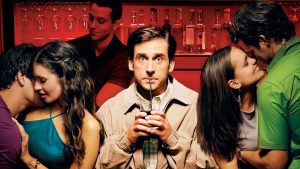
In a film starring one of Hong Kong’s most decorated celebrities that feels oddly autobiographical in a meta type of way, The Movie Emperor spawns one of Andy Lau’s most interesting performances in recent years. As one of Asia’s most renowned superstars, this almost feels like a perfect starring vehicle that mirrors reality, while also purposefully (and appropriately) distorting it for narrative gain. Ning Hao doesn’t fully capitalize on what is truly a golden opportunity, but still manages to create a thought provoking satire with enough inside baseball to please fans of Hong Kong cinema.
Lau plays Lau Wai-Chi (which is a play on the real life Chinese names of Tony Leung, Steven Chow and Lau himself), a veteran actor who is still in full pursuit of awards and accolades, despite his storied career. After another loss at the Hong Kong Film Awards, he decides to ramp up his efforts and immerses himself in the role of a farmer, stripped of all the glamour and spectacle of his usual character choices. His decision to pursue a more ‘awards bait’ role is marred by his inability to navigate the evolving world of fame that has come with the advent of social media. What follows is a number of mishaps that reveal both his sense of self worth and cruel vanity, which might just fit the bill for an aging superstar.
A film that should have come from Hong Kong?
Given how hard the film leans on Lau’s own career in real life, it’s almost bizarre that The Movie Emperor wasn’t a local Hong Kong production. On the surface, the film does feel inherently Hong Kong, with lots of dialogue in Cantonese (Hong Kong’s native language), particular between characters working with and for Lau Wai-Chi. Even the comedic beats during these interactions have some of the slapstick sensibilities that are reminiscent of Hong Kong comedies.
source: CMC Pictures
But outside of these elements, the film is clearly a product of mainland China, even if Lau’s towering portrayal of a Hong Kong superstar looms over the entire narrative. The end result, particular for fans of local Hong Kong cinema, is one that leaves emotions of discordance over what feels like a product stuck between two opposing walls. Despite being a mainland filmmaker, Hao deserves praise for being able to straddle two sides in order to create this duality in experiences within the film itself. It’s also perhaps a fitting approach to crafting a story like this, given how prevalent co-productions with Chinese counterparts have become for bigger Hong Kong films.
That being said, this is still a massively unique role for someone like Lau, and it’s hard not to lament over how much more special it might’ve been had the story come exclusively from his native region. It leaves mixed feelings, even if the overall balance still weighs on the positive side of things. Watching this made me think about 2006’s My Name is Fame, which was also a film about an aging actor circling the local awards circuit in Hong Kong. While that movie wasn’t nearly as clever and layered as The Movie Emperor, its sense of locality as a product is something that one hopes for in stories like this.
A layered satire fitting of Lau’s talents
At its heart, The Movie Emperor is a true satire that wears this label on its sleeves with heartfelt perfection. The meta aspects of the story might get lost on audiences not familiar with Lau’s career, but everything from nuanced inferences to more direct reflections are scattered throughout the film. Lau’s popularity as a bonafide international superstar makes him the perfect specimen for a film like this. In the end, Hao is careful, and luckily quite successful, in not portraying his character as a clear parody of the evolving nature of being a modern day celebrity. Rather, the satirical voice of the film frames the narrative as a cautionary tale of not only the price of fame, but the complexities of navigating it with grace. At times, the film does gesture towards ideas that aren’t fully realized, but with a narrative that packs so much (and with three credited writers), it’s perhaps an expected deficiency.
source: CMC Pictures
Lau is perfect as Lau Wai-Chi, and portrays him with a sense of endearing tenderness, despite all his flaws as a character. The imperfect modelling of a celebrity is something Lau doesn’t shy away from, which is a real feat when you consider how closely the character is supposedly modelled after his own life (despite still being fictional, of course). Not that Lau ever shies away from divisive roles, it’s just that he’s usually cast as the more valiant protagonist or romantic lead, but things have definitely started to shift in recent years Whatever the context, it’s simply a joy to see Lau in a role that truly flexes his talents as an actor. He’s pretty much good in anything these days, but when he’s pushed to the limit like this, it’s just extra icing on the cake.
Conclusions
With hints of oddball humour and contextual commentary on the evolving nature of fame, Hao successfully crafts a layered narrative that is both critical and celebratory of the modern-day film industry. Lau is perfect as the film’s leading man, and all the sharp inferences to his own career feels appropriately meta, yet still carries some sense of subtlety in its delivery. But a film that is clearly about (and starring) a renowned Hong Kong celebrity, that isn’t a product of its local film industry, does leave a strange taste. In a way, it’s reflective of how dominant a role China plays when it comes to modern day stardom for Hong Kong celebrities, and is perhaps another reason why Lau was attracted to this project in the first place.
In his opening remarks during the film’s world premiere at last year’s Toronto International Film Festival, Lau started his introduction in Cantonese, before quickly switching to Mandarin. As Cantonese audiences in the theatre yearned to claim Lau as one of their own, he made it abundantly clear that his goal was to appease both sides (and perhaps one side more than the other). That goal was only amplified through The Movie Emperor, which is more a sign of the times, rather than a point of criticism. However you slice it, there’s lots to digest here, which is a testament to the film’s merits as a truly engaging satire.
The Movie Emperor was released in theaters on February 24, 2024!
Does content like this matter to you?
Become a Member and support film journalism. Unlock access to all of Film Inquiry`s great articles. Join a community of like-minded readers who are passionate about cinema – get access to our private members Network, give back to independent filmmakers, and more.






